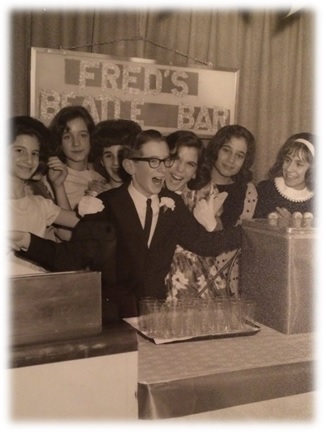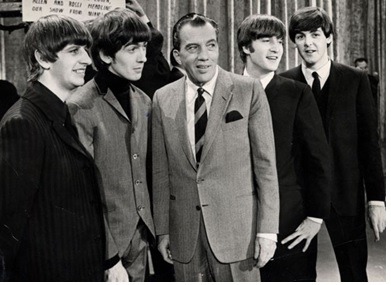Where were you when the Beatles hit the shores of America back in 1964 on this day?
For many of you reading this blog post, you weren’t even on this planet yet. But for those of us of a certain age, the memory is as indelible your recall of where you were and what you were doing when the U.S. landed on the moon or the attack on America on 9/11.
But whether you discovered the Beatles in “real time” back in late ’63 or you remember your first encounter with the Fab Four on the radio or via your parents or older sibling, the moment was probably unforgettable.
I’ll tell you my story, because while it has elements of sheer embarrassment (as you’ll see below), it says a lot about how John, Paul, George, and Ringo influenced my career path. You see, February of 1964 was an important month for me, too, because it marked my 13th birthday, also known as my Bar Mitzvah.
 In those days, there were no themes, no DJs, and no photo booths. The Bar Mitzvah boy (girls were not given Bat Mitzvahs in those days) was pretty much cut out of the proceedings, except for the religious service.
In those days, there were no themes, no DJs, and no photo booths. The Bar Mitzvah boy (girls were not given Bat Mitzvahs in those days) was pretty much cut out of the proceedings, except for the religious service.
My parents went to great lengths and expense to put together a party for 150 of their closest friends and relatives; they selected a band that featured traditional ‘40s and ‘50s hits (along with “the Twist”), and worked on the menu and seating arrangement. I got to invite 20 friends who all sat together and tried their best to look comfortable in dress-up clothes.
But a few weeks before the big day, my mom informed me that a small ice cream bar would be set up for my friends after dinner. And I was awarded the naming rights.
As you can see to the left, surrounded by a group of 12 and 13 year-old girls, I chose very wisely.
Note that it wasn’t a “Beach Boys Bar” or a “Chubby Checker Bar” or a “Dusty Springfield Bar.”
Even back then, I had a pretty good idea where the musical puck was headed, and that there was something very special about these four lads from Liverpool. Who knew how this event might have been symbolic of what was to come twenty years later when we launched the Classic Rock format? But when I look at this picture, I first cringe, but then I nod along with the 13 year-old version of me.
One of my presents was a small tape recorder with 3” reels, and yes, I sat in front of the TV set the next evening as Ed Sullivan introduced the Beatles, holding up the microphone to the tinny speaker in our RCA black and white television.
And so here we are, a half century later, and we’re still talking about the Beatles, they still matter, they’re still in the news, and they continue to have a massive footprint on the music industry.
Most of us now realize that this type of mega pop culture phenomenon will never happen again – certainly not on this scale. The same night I was recording the Fab Four in my living room, I was joined by 73 million other people. In 1964 America, this was a ridiculously big event on a scale the unimaginable today.
So how do you explain the Beatles in the context of other pop culture moments in time? And why are they still so present and relevant today?
 Last month, NBC News interviewed Darrin Duber-Smith, a marketing professor at Metropolitan State University in Denver. He refers to the Beatles as a “first mover” – they were the first in their category (British Invasion bands) and also became symbols of an important moment in our history.
Last month, NBC News interviewed Darrin Duber-Smith, a marketing professor at Metropolitan State University in Denver. He refers to the Beatles as a “first mover” – they were the first in their category (British Invasion bands) and also became symbols of an important moment in our history.
Duber-Smith refers to the Beatles as “transformative,” and as we learned through the ’60s, their influence went beyond music and into fashion, hair styles, lifestyles, and attitudes.
When you think back to other “first movers” in media and entertainment, MTV comes to mind as well as the iPod, iPhone, and now, the iPad. Howard Stern would have to be considered a “first mover” as well.
The common factors – risk-taking, nerve, rule-breaking, and yes, great marketing.
Of course, all those “first movers” are with us today, still exuding impact and influence that go well beyond their initial debuts. So happy 50th to the Fab Four, and here’s to radio playing a ton of Beatles music over the next couple of weeks.
But more importantly, hopefully there are some radio programmers, managers, and owners thinking about the “first mover” phenomenon.
Now that would be fab.
- What To Do If Your Radio Station Goes Through A Midlife Crisis - April 25, 2025
- A 2020 Lesson?It Could All Be Gone In A Flash - April 24, 2025
- How AI Can Give Radio Personalities More…PERSONALITY - April 23, 2025




Mazel-tov Fred!
Thanks, Greg, from one Beatles fan to another. Your thank-you note is in the mail!
We’re there any boys at this party?
Yeah, but who cares about them?
Seeing your Beatles Bar picture is the best surprise I’ve had all year!
Thanks for sharing.
Embarrassing as hell, but a great memory from that wonderful time. Great to hear from you, Greg.
Fred,
It’s pretty telling that in addition to the Beatles playing through the tinny speakers of my Bar Mitzvah era (c.1967), they were also playing through the multi-thousand dollar sound systems of the professional DJ’s of my son’s and daughter’s era (c.1999). That is staying power that not even all first movers have, putting the lads in a class by themselves.
Today’s first movers are not in radio, where risk taking was abandoned to the short term orthodoxy of Wall Street after consolidation began. Today’s first movers are mostly in tech, where the pace of change and innovation is dizzying. Only investment in imagination and the long future–not next quarter–will change the trajectory of the radio industry.
My real reason for replying, however, is not to lament our late greatness, but to inquire which of those girls was the first mover of your seventh grade class. In mine, it was Shelly Cohen, and to be sure, her moves were lost on the thirteen year-old boys who were busy shoving each other on the outskirts of the dance floor, and decidedly NOT talking to the girls!
These photos are embarrassing, sure, but they remind us of how far we’ve come, and what’s possible when we don’t know the rules.
Jon, thanks for the perspective. And as for which of those girls was the first-mover, I’ll answer it in a different way – Ruth Bennett (second from right) turned out to the be the head writer on “Family Ties,” Michael J. Fox’s first show. She was quiet, but as we know, still waters run deep. And maybe it’s telling, but I remember every one of their names! Good times.
Fred,
I absolutely love the picture! Not so much for the nostalgia, but for the attitude. The expression on your face is priceless.
A long time ago to be sure. Thanks for chiming in, Doug.